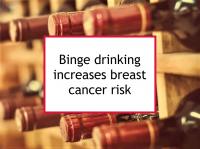Alcohol is one of the most well-established risk factors for breast cancer. Wine, including red wine , is no less harmful than beer or hard liquor. The potentially beneficial resveratrol content of red wine does not effectively counteract the cancer-promoting effects of its alcohol content.
Women who are fast metabolizers of alcohol (and therefore "can't hold their liquor") have a higher risk of breast cancer from alcohol consumption than slow metabolizers. It has also been shown that having multiple drinks in one day increases breast cancer risk more than having the same number of drinks spaced over a week. Now a major new prospective study has confirmed the link between binge drinking and markedly heightened breast cancer risk.
Alcohol and breast cancer
As noted above, even low levels of alcohol consumption have been associated with increased breast cancer risk in most studies that have examined its effects. The increased risk appears to be greater among postmenopausal women and for estrogen receptor positive (ER+) tumors. However, alcohol consumption has also been shown to promote premenopausal HER2-positive (HER2+) breast cancer development in a mouse model of HER2+ breast cancer.
Consuming alcohol during adolescence increases risk of breast cancer in adulthood. For example, in one study, teenage girls with a family history of breast cancer who consumed seven alcoholic drinks per week doubled their risk of benign breast disease, which in turn increased their subsequent risk of breast cancer.
Alcohol consumption that takes place before diagnosis has been found to be associated with a modest but significant increase in breast cancer recurrence. One study reported that elevated risk of recurrence was found among wine drinkers who had at least two servings per day compared to no alcohol intake. In addition, alcohol intake after diagnosis is associated with increased breast cancer recurrence and death, especially for postmenopausal and overweight or obese women. Based on the available evidence, up to one serving of alcohol every third day with food appears to be a safe level of consumption. A serving incorporates 14 g of alcohol, or approximately 5 oz glass of wine, 12 oz of beer, or a 1.5 oz shot of alcohol. Alcohol should be avoided during tamoxifen treatment.
Latest research links binge drinking to heightened risk
The study referenced above was designed to investigate the association between binge drinking and risk of breast cancer. Alcohol consumption can have varying effects on breast cancer risk depending on the pattern of consumption even when the total consumed is held constant.
The study included 9,577 participants in the SUN Project, a Spanish cohort of university graduates established in 1999. Participants were administered a 556-item baseline lifestyle questionnaire, which included a validated food-frequency questionnaire. Follow up questionnaires were completed every other year.
Non-drinkers were excluded from the study. Binge drinking was defined as the consumption of at least six alcoholic drinks in a single day. The women were followed for a median of 11.8 years. A total of 88 cases of breast cancer were diagnosed during 104,932 women-years of follow-up.
Women in the binge drinking group were found to have 1.76 times the risk of breast cancer compared to those who consumed alcohol but did not binge drink. Further analysis showed that the risk was particularly high for premenopausal women (2.06 times). The authors comment that the study contributes new evidence concerning the association of binge drinking with breast cancer risk.
Please see our alcohol page for more information.
